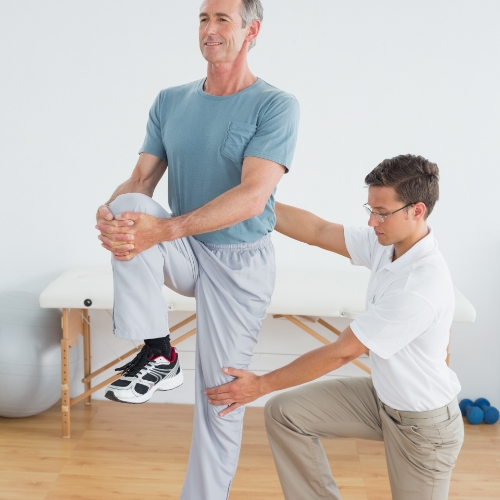Improve your balance with physical therapy in Boise & Meridian, ID!
Have you noticed yourself getting lightheaded or struggling with your equilibrium? Do you find yourself grabbing onto furniture or leaning against a wall to steady your body throughout the day? You might be dealing with a balance disorder that requires attention. At Idaho Spine & Sports Physical Therapy, our physical therapists can help you figure out the source of your symptoms and guide you to a solution that works.
Balance disorders can affect individuals of all ages and genders. Loss of balance is one of the most common disorders leading to falls in people over 65. There are several possible causes for changes to balance, and you can resolve most with physical therapy!
Make an appointment with our Boise or Meridian, ID office for physical therapy today. Our balance disorders specialty services at Idaho Spine & Sports Physical Therapy can help you improve your quality of life!
What are balance disorders?
Balance deficits can be from physical conditions like injuries or conditions like arthritis in the feet, knees, or hips. It is also possible that neurological conditions can lead to balance deficits. For example, Parkinson’s or MS can lead to balance loss and nerve injuries from spine disorders or peripheral neuropathies. And in some cases, changes to balance are more mental in nature, meaning people’s fear affects how they move and the activities they pursue.
One of the most prevalent factors interfering with our balance is related to our vestibular system. The vestibular system regulates how our brain receives information, and when impaired, it can convince the brain that you are moving when you are not. When walking, for example, you may feel like you are falling or stumbling. Furthermore, you may experience dizziness and blurred vision. Fortunately, our physical therapists can figure out the root cause of your issues and help you find solutions that work!

What causes balance disorders?
Our body is an interconnected, highly organized, and interactive system that, when functioning correctly, is capable of incredible feats of physical performance. The system has built-in safety features to ensure our body is safe and protected from harm. One of these systems is somatosensation, sometimes called our “sixth sense.”
Our body’s ability to correctly identify and manage our sensations and how they interact with our surrounding environment is the key to maintaining our balance. Any injury or condition (acute or chronic) can impair the regulation of our senses and disrupt our body’s ability to balance.
Balance is usually thought of in two ways, static and dynamic.
- Static balance is the ability to maintain an upright posture with the line of gravity inside the base of support (i.e., standing still)
- Dynamic balance is the ability to maintain stability during changes to the base of support (i.e., moving, walking, running, etc.)
One of the most important systems responsible for our ability to stay balanced is our vestibular system. The vestibular system controls your sense of position, statically and dynamically, and often a vestibular system dysfunction is at the root of many balance issues.
How are balance disorders treated at Idaho Spine & Sports Physical Therapy?
Physical therapy is one of the most effective treatments for all types of balance disorders. Our team is highly skilled at identifying all the factors that may be influencing your balance and address each one with the most effective treatments. At your initial evaluation, a thorough assessment will be performed.
At Idaho Spine & Sports Physical Therapy, our physical therapists will thoroughly examine your static and dynamic balance. This will include specific tests for your balance and gait. We will also examine your posture including your natural stance, and typical movement patterns. In addition we will ask about your past medical history, any injuries (old and new) or any other symptoms you may be experiencing.
A comprehensive clinical risk assessment usually consists of:
- A review of fall history
- An examination of gait, balance, mobility, and muscle weakness
- An assessment of perceived functional ability and fear of falling
- Assessment of visual impairment and effects of corrective eyewear
- Home hazards/environment assessment
- A cardiovascular exam including resting heart rate checks, active heart rate check
- A medication review
The results of your evaluation will help us get to the root of your problem and give us the tools to design a personalized treatment plan. The strategy we use will be based on proven techniques and will be tailored to your specific requirements.
It is estimated that around 50% of all dizziness stems from a problem with your vestibular system. The vestibular system gives our brains vital information about how we move and how our heads are positioned. It also involves motor functions controlling our overall balance, stability, and posture.
A few balance disorders related to the vestibular system include:
- Benign Paroxysmal Positional Vertigo (BPPV)
- Meniere’s disease
- Vestibular Neuronitis
- Perilymph Fistula
Our physical therapists frequently use the following strategies and treatment methods:
Rehabilitating the vestibular system
Vestibular therapy enables you to maintain a steady balance by improving and restoring the vestibular system’s function. Hence, the brain receives information from our body and our environment correctly. If you have a balance or gait problem, our Boise & Meridian, ID physical therapists will teach you specific exercises to help establish the normal functioning of your vestibular system.
Customized vestibular rehabilitation is conducted through a process of adaptation and compensation. We use passive and active therapies to reprogram the vestibular system and form brain connections to adjust imbalances and regain stability. Some common methods that accompany vestibular treatment may include:
- Specific head positioning techniques
- Balance and coordination training
- Home programs
- Patient education
Our team uses daily balance training to train the vestibular system, including head-turning in all three planes of movement. We feel that older patients, in particular, should undergo specific training to prevent falls and improve their gait.
Exercising for strength and mobility
Physical impairments like joint issues or muscle weaknesses can make you unsteady on your feet and lead to loss of balance. Fortunately, these types of conditions respond very well to exercises.
During your assessment, you will also learn about the areas of your body that need strengthening. You will learn muscle-building exercises and targeted mobility training that will make it much easier to move around and reduce your risk of injury.
Our therapists at Idaho Spine & Sports Physical Therapy will prescribe balance, coordination, strengthening exercises, and targeted stretches. Our movement techniques can help restore your vestibular system’s functioning and get your balance back on track!
Ready to recover from your balance disorder? Contact our Boise or Meridian, ID clinic today!
At our clinic, we are happy to say we can provide you with the right treatment plan for your needs, so you can get back to living your life comfortably!
Are you ready to get back on your feet and decrease your risk of a balance-related injury? If so, contact Idaho Spine & Sports Physical Therapy in Boise or Meridian, ID to schedule a consultation and start on the road to recovery today!
Your Next Steps…
Request An Appointment
Receive A Custom Treatment Plan
Work Hard and Progress In Your Recovery
Recover & Enjoy Life Pain-Free!

